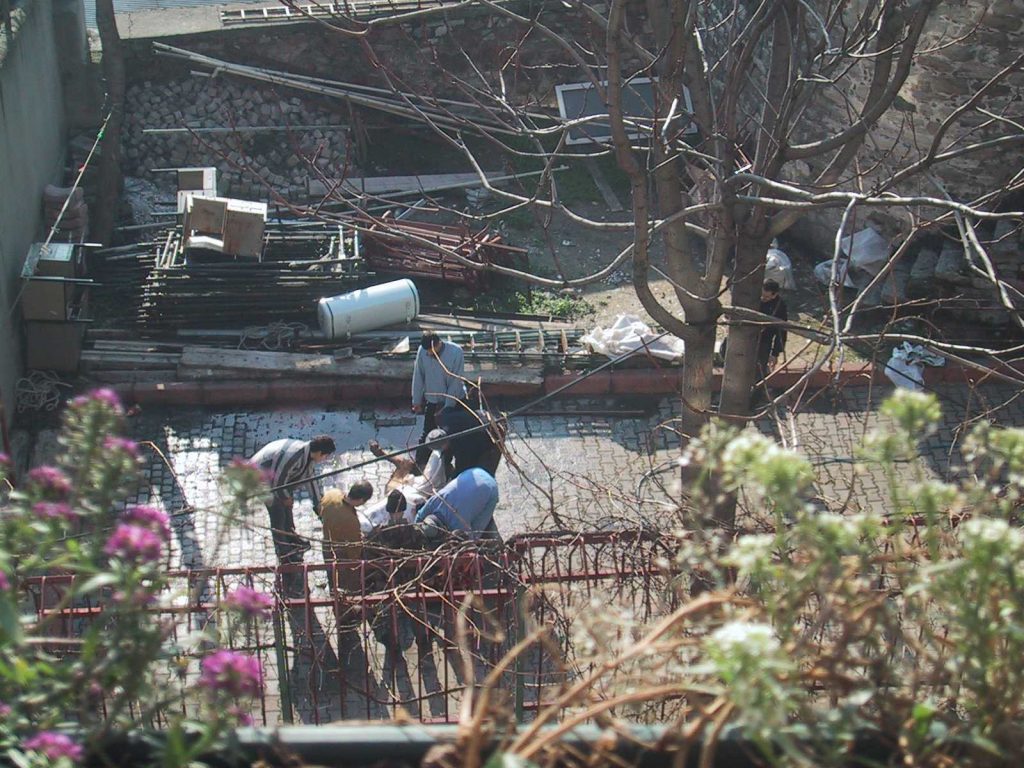With the Kurban Bayram holiday this week, many people across Turkey are shopping for sacrificial beasts to give thanks, in turn then sharing their bounty with neighbors and people in need. In an effort to clean up the activities, an Istanbul district has set up an animal bazaar and slaughtering facilities. Having a good sense is significant when purchasing a sacrificial animal and checking its nails, noses, skin and weight are important, says one salesman.

The commotion has reached a fevered pitch at an animal bazaar in Istanbul’s Küçükçekmece Municipality, where buyers and sellers are converging to haggle over sacrificial beasts ahead of the Kurban Bayram holiday on Tuesday.
The flurry of bargaining and the flood of people is matched by the ruckus in dozens of 100-square-meter pens where rams and bulls try to escape through wooden fences and salesmen have to beat them back with a stick from time to time to keep them contained.
The temporary animal market set up by the municipality in the Sefaköy neighborhood consists of 40 tents accommodating the pens and the thousands of rams and bulls being bought and sold for the upcoming Feast of the Sacrifice. The market also has four mobile container structures dedicated to sacrificing the animals.
Bayram Bozbay, an Istanbul resident, said he had come to the market to purchase a bull to share with six people and smiled as he shook hands with the salesman. During the bargain, Bozbay told the man to “make it straight,” hoping he would round down to the next whole hundred, but the salesman would not budge. Bozbay paid 7,350 Turkish Liras for a 350-kilogram bull.
“We will sacrifice this bull on the morning of the feast and distribute some to the poor,” said Bozbay on Thursday. “Then we plan to invite relatives for a big meal and visit our neighbors to celebrate their bayram’s afterward.”
The Religious Affairs Directorate has this year made a large effort to clean up bayram activities and prohibited animal sacrifices on the streets following bloody scenes and numerous injuries in previous years. The directorate has declared that only professional butchers and people who have completed municipal certification courses are allowed to perform sacrifices.
As part of its efforts, the directorate has hired 24 professional butchers to work at the market and brought in four fully equipped mobile slaughtering houses, two of which are reserved for charity foundations.
“We charge 200 liras to sacrifice a bull,” said Salih Erdem, the head butcher. Nearby, salesmen offer a wide variety of knives, hooks and choppers for sale on portable stands or out of the trunks of their cars.
Market trouble
To increase the cleanliness of the Kurban activities, animals from eastern Turkey have been banned from the European side of Istanbul because of the risk for foot-and-mouth disease, a highly contagious viral disease carried by cloven-hoofed animals.
“The rams and bulls brought from Thrace to prevent foot-and-mouth disease were not enough. I couldn’t bring any animals from the East,” said Şerif Gürsoy, a 35-year-old stockbreeder, complaining about not selling enough animals this year.
“I brought 70 rams and 17 bulls that I raised from Edirne. In five days, I have sold 55 of them,” Gürsoy said, adding that many customers would not bargain this year due to the low number of animals on the market.
He said he charges 13 liras per kilogram for rams and 12 liras per kilogram for bulls, but that he would barely profit in the end because of the high rent for the tents. He said he couldn’t afford to rent his tent for more than 10 days.
Having a good sense about a ram or a bull is a significant element when purchasing a sacrificial animal, Murat Çoşkun, 50, said, and checking the sheep’s nails, noses, skin and weight are important. “The sheep should be energetic and restless. Look at the imported animals; they are immobile. I believe they were injected with hormones,” he said.
Ahmet Uysal, 40, a salesman who brought sheep from Bulgaria, however, said people started rumors about the imported animals to increase the prices for locally raised sacrificial animals.
“I think there are enough animals in Turkey, yet people are trying to charge more money by saying the stock is low,” said Uysal, adding that he has sold 1,000 sheep so far. “I charge 10 liras per kilogram for sheep,” he said, demonstrating that his prices are cheaper.
Meanwhile, 25-year-old Orkun Özbey and 25-year-old Erkan Kaya said all the prices at the animal bazaar were too high. They said they would drive to Lüleburgaz, in Thrace’s Kırklareli province, to get a reasonable deal at the provincial branch of the state-owned Meat & Fish Enterprise, or EBK.
“Here, one seller tried to sell us a bull for 5,800 liras. We certainly won’t spend that much by driving to Lüleburgaz. Driving and shipping altogether will cost about 200 liras,” said Özbey.
Besides prices, some people complained about the facilities and services the municipality offered at the market. Çoşkun said he spends every night in the tent with the animals, hay and feed.
“I paid 4,000 liras to rent this tent, but the municipality hasn’t provided any water, light or toilet services,” Çoşkun said. “I have performed this job for 40 years, and I haven’t benefited from any kind of services this year. We will take this to court after the holiday. Last year, we were renting a stand for 2,000 liras, and now it has doubled.”
